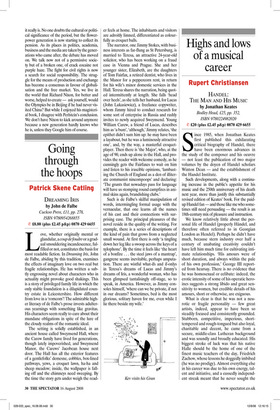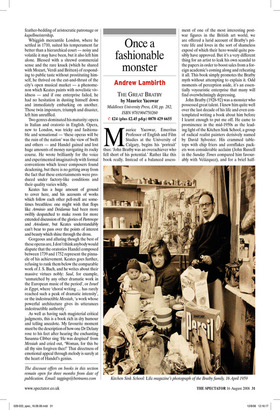Highs and lows of a musical career
Rupert Christiansen
HANDEL: THE MAN AND HIS MuSIc by Jonathan Keates Bodley Head, £25, pp. 352, ISBN 9780224982020 ✆ £20 (plus £2.45 p&p) 0870 429 6655 Since 1985, when Jonathan Keates first published this exhilarating critical biography of Handel, there have been enormous advances in the study of the composer and his oeuvre — not least the publication of two major volumes by the doyen of Handel scholars Winton Dean — and the establishment of the Handel Institute.
Such developments, along with a continuing increase in the public’s appetite for his music and the 250th anniversary of his death next year, more than justify this substantially revised edition of Keates’ book. For the paidup Handel fan — and those like me who sometimes still need persuading — the result is an 18th-century mix of pleasure and instruction.
We know relatively little about the personal life of Handel (properly Händel, and therefore often referred to in Georgian London as Hendel). Perhaps he didn’t have much, because stern industry over half a century of unabating creativity couldn’t have left him much time for cultivating intimate relationships. ‘His amours were of short duration, and always within the pale of his own profession,’ George III reported from hearsay. There is no evidence that he was homosexual or celibate: indeed, the erotic intensity of some of his operatic heroines suggests a strong libido and great sensitivity to women, but credible details of his amours, short or otherwise, are exiguous.
What is clear is that he was not a neurotic or fragile personality — few great artists, indeed, appear to have been so steadily focused and consistently grounded. Stubborn, competitive, imperious, shorttempered and rough-tongued but also loyal, charitable and decent, he came from a secure, middle-class Lutheran background and was soundly and broadly educated. His biggest stroke of luck was that his native Halle should be the home of one of the finest music teachers of the day, Friedrich Zachow, whose lessons he doggedly imbibed (he was no prodigy). Almost everything else in his career was due to his own energy, talent and initiative, and a cussedly independent streak meant that he never sought the feather-bedding of aristocratic patronage or kapellmeistership.
Whiggish mercantile London, where he settled in 1710, suited his temperament far better than a hierarchical court — noisy and volatile it may have been, but it also left him alone. Blessed with a shrewd commercial sense and the rare knack (which he shared with Mozart, Verdi and Britten) of responding to public taste without prostituting himself, he thrived on the cut-and-thrust of the city’s open musical market — a phenomenon which Keates paints with novelistic vividness — and if one enterprise failed, he had no hesitation in dusting himself down and immediately embarking on another. Those twin imposters, triumph and disaster, left him unruffled.
Two genres dominated his maturity: opera in Italian and oratorio in English. Opera, new to London, was tricky and fashionable and sensational — ‘these operas will be the ruin of the nation’ was the view of Swift and others — and Handel gained and lost huge amounts of money navigating its rocky course. He wrote brilliantly for the voice and experimented imaginatively with formal conventions which lesser composers found deadening, but there is no getting away from the fact that these entertainments were produced under factory-like conditions and their quality varies wildly.
Keates has a huge amount of ground to cover here, and his accounts of works which follow each other pell-mell are sometimes breathless: one might wish that flops like Arminio and Deidamia had been more swiftly despatched to make room for more extended discussion of the glories of Partenope and Ariodante, but Keates understandably can’t bear to pass over the points of interest and beauty which shine through the dross.
Gorgeous and alluring though the best of these operas are, I don’t think anybody would dispute that the oratorios Handel composed between 1739 and 1752 represent the pinnacle of his achievement. Keates goes further, refusing to rank them below the comparable work of J. S. Bach, and he writes about their massive virtues nobly: Saul, for example, ‘unmatched by any other dramatic work in the European music of the period’, or Israel in Egypt, where ‘choral writing ... has rarely reached such a peak of dramatic intensity’, or the indestructible Messiah, ‘a work whose powerful architecture gives its utterances indestructible authority’.
As well as having such magisterial critical judgments, this is a book rich in dry humour and telling anecdote. My favourite moment must be the description of how one Dr Delany rose to his feet after hearing the enchanting Susanna Cibber sing ‘He was despised’ from Messiah and cried out, ‘Woman, for this be all thy sins forgiven thee!’ That directness of emotional appeal through melody is surely at the heart of Handel’s genius.



























































 Previous page
Previous page